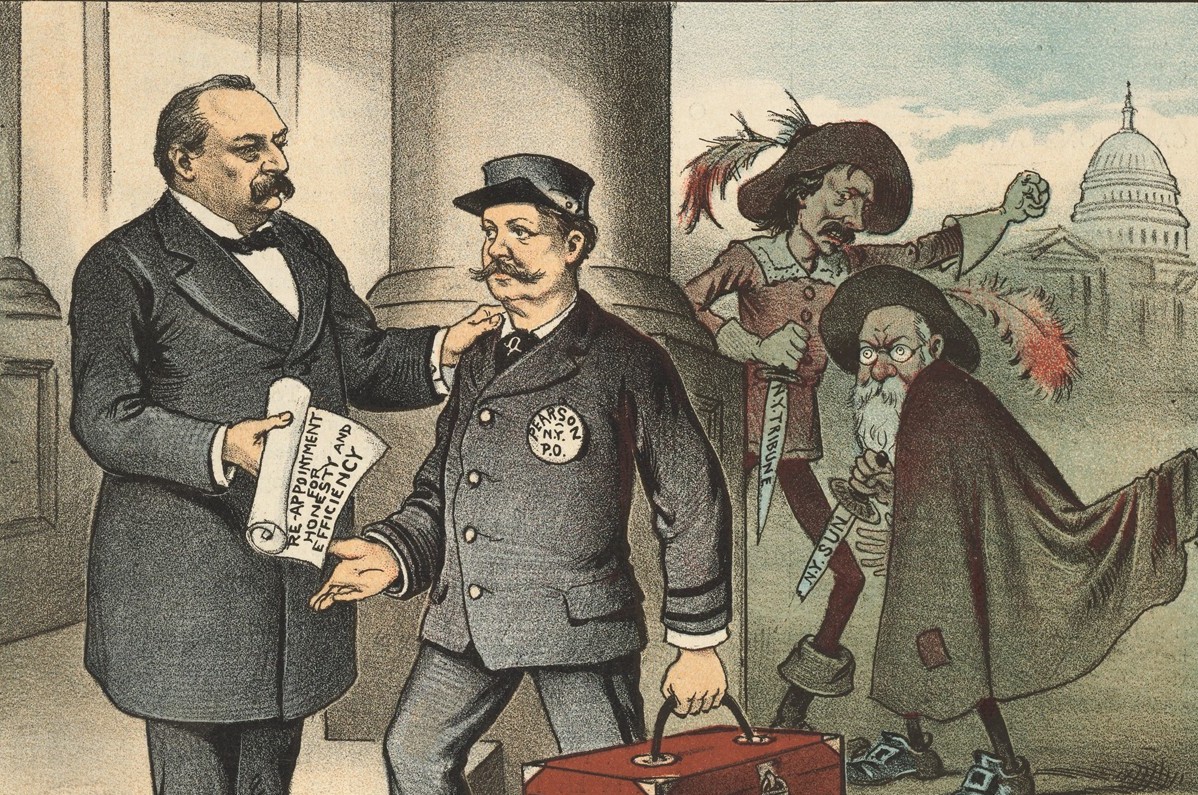The Deep State Problem

Is the Supreme Court on board with President Trump’s expansive view of executive power? A smoke signal could appear as soon as today in the case of Bessent v. Dellinger, which centers on the president’s ability to fire federal employees. The case could be decisive to Elon Musk and Mr. Trump’s push to scale back the federal bureaucracy. The dispute is whether laws shielding federal employees from termination without cause are constitutional.
The Sun has long doubted the merit of such laws, which thwart the president’s sole authority over the executive branch. As far back as 1883, when President Arthur signed into law the Pendleton Act, these columns were dubious. “The Pendleton Sham” is how the Sun in an editorial described the “so-called reform.” That was partly because the Civil Service Commission created at the time infringed on the president’s power of appointment, the Sun caviled.
The Sun’s opposition to Civil Service reform was such that, in 1885, Puck magazine depicted the paper’s editor, Charles Dana, as a dagger-wielding villain “angry that an efficient and honest citizen” was appointed by President Cleveland “to a civil service position.” The president was shown reappointing a postman for “honesty and efficiency,” while Dana and the editor of the Tribune mutter “Foiled Again!”
Yet the civil service led to its own abuses. It was designed to protect federal employees from summary firings, once traditional at the changing of administrations. This amounted to a “bolstering of bureaucracy at the president’s expense,” these columns reckoned more recently. The Pendleton Act helped to lay the foundations for what historian Williamjames Hoffer calls the “fully developed regulatory” — or deep — “state.”
Some 14 decades later voters brought in President Trump to turn back the clock. So the Nine’s handling of Bessent could offer clues as to the possibilities. The case was brought by the head of the federal Office of Special Counsel, Hampton Dellinger, a Biden appointee. Mr. Trump on February 7 fired Mr. Dellinger “without cause,” says Judge Amy Berman Jackson, who heard the dispute at the district court level.
As a matter of law, Mr. Dellinger would appear to have a case to contest his dismissal, since his agency was created by the Civil Service Reform Act of 1978 and buttressed by the Whistleblower Protection Act of 1989. The Special Counsel, Judge Jackson says, “may be removed by the President only for inefficiency, neglect of duty, or malfeasance in office.” Mr. Trump contends statutory limits are unconstitutional.
Judge Jackson paused Mr. Dellinger’s termination pending a hearing. An appeals court declined to lift her hold. Mr. Trump’s Justice Department is seeking relief from the Nine. Legal sage Steven Vladeck suggests that Mr. Trump’s appeal is “premature” at this point, but that the president “has moved so aggressively in this case” because “the government knows it’s playing a relatively stronger hand” in Bessent than in other cases over fired federales.
That’s because while Mr. Trump has fired many federal employees, Mr. Dellinger is — or was — the head of a federal agency. High court precedent in a 2020 case, Seila Law v. Consumer Financial Protection Bureau, states that heads of federal agencies “must be removable by the President at will,” as Chief Justice Roberts put it. The president, too, has “the authority to remove those who assist him in carrying out his duties,” the chief justice said earlier.
“Without such power, the President could not be held fully accountable for discharging his own responsibilities,” he added. “The buck would stop somewhere else.” That speaks to the Constitutional mandate for the president alone to take care that the laws are faithfully executed. That “diffusion of authority,” the chief warned, citing Hamilton, “would greatly diminish the intended and necessary responsibility of the chief magistrate himself.”
Even so, Seila Law concedes the validity of laws offering “removal protection for an inferior officer,” the chief justice said. Will the Nine reevaluate that precedent? If not, then even a win for Mr. Trump in Bessent “would tell us nothing” about lawsuits from “lower-level officers within federal agencies,” and others shielded by civil service laws, Mr. Vladeck says. If such suits prevail, advocates for scaling back the deep state could well lament: “Foiled Again.”


